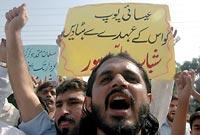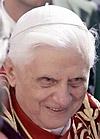Saturday, September 16, 2006 - Page updated at 12:00 AM
Pope's remarks on Islam spark outrage
The Associated Press

K.M. CHAUDARY / AP
Angry Muslims in Lahore, Pakistan, hold a rally on Friday to condemn the pope's remarks during his recent visit to Germany.

Pope Benedict's talk angered Muslims.
ISTANBUL, Turkey — Pakistan's legislature unanimously condemned Pope Benedict XVI. Lebanon's top Shiite cleric demanded an apology. In Turkey, the ruling party likened the pontiff to Hitler and Mussolini and accused him of reviving the mentality of the Crusades. In the Middle East, seven churches are sacked and burned. In Somalia, an elderly Catholic nun is murdered in cold blood by gunmen.
Across the Islamic world Friday, Benedict's remarks on Islam and jihad in a speech in Germany unleashed a torrent of rage that many fear could burst into violent protests like those that followed publication of caricatures of the Prophet Muhammad earlier this year. "We will raze Vatican City; St. Peter's [Basilica] will be an utter ruin, the pope will serve us, he will be our stable hand!" a prominent Muslim cleric swore in Baghdad.
By citing an obscure medieval text that characterizes some teachings of Islam's founder as "evil and inhuman," Benedict inflamed Muslim passions and aggravated fears of new anti-Western protests.
Benedict devoted his lecture at the University of Regensburg, Germany, to the idea that reason is in accord with God's nature, but that reason without faith yields an overly secularized society — a critique he has often made of the modern Western world.
In linking God to reason, Benedict attacked the notion of "holy war," which is one facet of the Islamic concept of jihad. He chose a quote from the Christian Byzantine emperor Manuel II Paleologus, who in 1391 was warring with Muslim armies.
" 'Show me just what Muhammad brought that was new, and there you will find things only evil and inhuman, such as his command to spread by the sword [by jihad] the faith he preached,' " Benedict quoted the emperor as saying.
The pope did not explicitly agree with nor repudiate the comment.
The last outpouring of Islamic anger at the West came in February over the prophet cartoons first published in a Danish newspaper. The drawings sparked protests — some of them deadly — in almost every Muslim nation in the world.
Some experts said the perceived provocation by the spiritual leader of more than a billion Roman Catholics could leave even deeper scars.
"The declarations from the pope are more dangerous than the cartoons, because they come from the most important Christian authority in the world — the cartoons just came from an artist," said Diaa Rashwan, an analyst in Cairo, Egypt, who studies Islamic militancy.
On Friday, Pakistan's parliament adopted a resolution condemning Benedict for making what it called "derogatory" comments about Islam, and seeking an apology. Hours later, the Pakistani Foreign Ministry summoned the Vatican's ambassador to express regret over the pope's remarks Tuesday.
Notably, the strongest denunciations came from Turkey — a moderate democracy seeking European Union membership where Benedict is scheduled to visit in November as his first trip as pope to a Muslim country.
Salih Kapusuz, deputy leader of Turkish Prime Minister Recep Tayyip Erdogan's Islamic-rooted party, said Benedict's remarks were either "the result of pitiful ignorance" about Islam and its prophet or, worse, a deliberate distortion.
"He has a dark mentality that comes from the darkness of the Middle Ages. He is a poor thing that has not benefited from the spirit of reform in the Christian world," Kapusuz told Turkish state media. "It looks like an effort to revive the mentality of the Crusades.
"Benedict, the author of such unfortunate and insolent remarks, is going down in history for his words," Kapusuz added. "He is going down in history in the same category as leaders such as Hitler and Mussolini."
Even Turkey's staunchly pro-secular opposition party demanded the pope apologize before his visit. Another party led a demonstration outside Ankara's largest mosque, and a group of about 50 people placed a black wreath outside the Vatican's diplomatic mission.
Vatican spokesman Federico Lombardi has tried to defuse the anger, saying the pope did not intend to offend Muslim sensibilities and insisting Benedict respects Islam. In Pakistan, the Vatican envoy voiced regret at "the hurt caused to Muslims."
But Muslim leaders said outreach efforts by papal emissaries were not enough.
"We do not accept the apology through Vatican channels ... and ask him [Benedict] to offer a personal apology — not through his officials," Grand Ayatollah Mohammed Hussein Fadlallah, Lebanon's most senior Shiite cleric, told worshippers in Beirut.
Rashwan, the analyst, feared the official condemnations could be followed by widespread popular protests. There had been scattered demonstrations in several Muslim countries.
"What we have right now are public reactions to the pope's comments from political and religious figures, but I'm not optimistic concerning the reaction from the general public, especially since we have no correction from the Vatican," Rashwan said.
About 2,000 Palestinians angrily protested Friday night in Gaza City. Earlier, Palestinian Prime Minister Ismail Haniyeh, of the Islamic militant group Hamas, said the pope had offended Muslims everywhere.
In Cairo, some 100 demonstrators stood outside the al-Azhar mosque chanting: "Oh Crusaders, oh cowards! Down with the pope!"
The head of Britain's Muslim Council, which represents 400 Muslim groups, said the emperor's views quoted by the pope were bigoted.
"One would expect a religious leader such as the pope to act and speak with responsibility and repudiate the Byzantine emperor's views in the interests of truth and harmonious relations between the followers of Islam and Catholicism," said Muhammad Abdul Bari, the council's secretary-general.
Many Muslims accused Benedict of promoting Judeo-Christian dominance over Islam.
Even Iraq's often divided Shiite and Sunni Arabs found unity in anger over the remarks, with clerics from both communities criticizing Benedict.
A statement posted at mosques in al-Anbar province, a center of the insurgency, warned that a previously unknown group would begin killing Iraqi Christians in three days unless the pope apologized. In Basra, a bomb exploded at the Assyrian Catholic Church on Friday evening, causing damage but no injuries, according to a church leader who said the attack stemmed from the pope's remarks.
In the United States, a Muslim group, the Council for American-Islamic Relations, asked for a meeting with a Vatican representative and urged more efforts toward improving understanding between Muslims and Catholics.
Information from Newsday and The Washington Post is included in this report.
Copyright © 2006 The Seattle Times Company
![]()
.gif)
Best
Northwest Employers
Vote for your favorite Northwest employers
in the 2008 NWjobs People's Picks contest. Vote
now.
- WSU did not verify provost's references
- Dino Rossi for governor | The Times recommends ...
- McCain "robo calls" draw bipartisan fire
- Linens 'n Things to close stores
- Tyrone Willingham throws away a young receiver's season | Steve Kelley
- Search dog finds climber missing 5 days on Mt. Adams
- Police say Burger King robbery was staged
- WaMu president tests market with $6 million home | Sunday Buzz
- Knox part of satanic rite, Italian prosecutors say
- I-5 stabbing suspect has violent history
- Dino Rossi for governor | The Times recommends ...
- WSU did not verify provost's references
- Linens 'n Things to close stores
- Restarting the heart of downtown Bremerton
- Gates Foundation: Agriculture called key to prosperity
- Mourning a country long ago
- Bienvenidos a Buenos Aires — now go eat, drink and be merry
- Bothell bodybuilder undaunted by genetic challenges
- Joe the plumber's story isn't watertight
- KingCo 4A | Skyline crushes Issaquah, 38-0



.gif)